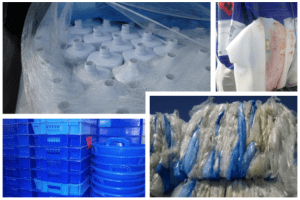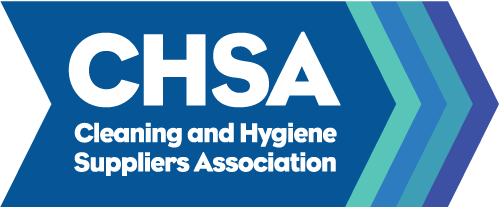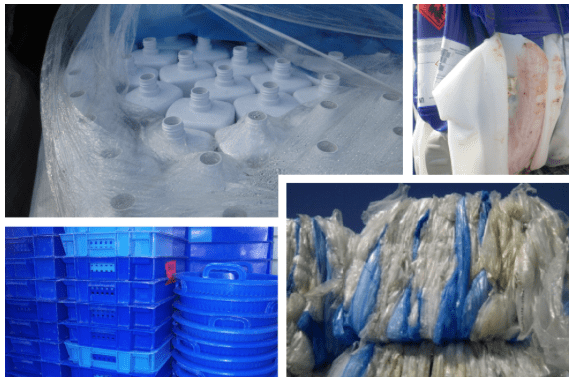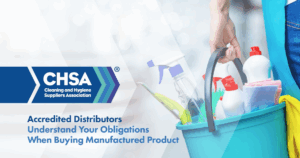“Plastic is embedded in every part of the cleaning and hygiene supply chain, from the manufacture of plastic sacks and the bottles containing cleaning chemicals to the packaging of individual products. This is why we have come together to address the challenge – an effective solution is only possible through cross sector collaboration.”
Stephen Harrison, Chairman of the Cleaning & Hygiene Suppliers Association (CHSA)
Doug Cooke, Chairman of the Cleaning Support Services Association (CSSA)
Chris James, CEO of Waste Management Industry Training & Advisory Board (WAMITAB)
 The broadcast of the BBC’s Blue Planet triggered a powerful emotional response to plastic, the general public almost immediately adopting the binary position that plastic is bad and anything that avoids the use of plastic is good. Politicians had to act. The Rt. Hon. Michael Gove, Secretary of State for Environment has been vocal, saying he will ban plastic straws and stirrers and wants to introduce a deposit return scheme for plastic bottles. His commitment and energy are to be welcomed but those of us working in the cleaning and hygiene industry understand the issue is complex.
The broadcast of the BBC’s Blue Planet triggered a powerful emotional response to plastic, the general public almost immediately adopting the binary position that plastic is bad and anything that avoids the use of plastic is good. Politicians had to act. The Rt. Hon. Michael Gove, Secretary of State for Environment has been vocal, saying he will ban plastic straws and stirrers and wants to introduce a deposit return scheme for plastic bottles. His commitment and energy are to be welcomed but those of us working in the cleaning and hygiene industry understand the issue is complex.
Our member companies are run by and employ members of the general public. From a personal perspective, they genuinely want to do the right thing for the planet but, when faced with hard commercial reality, it’s not easy to know what that is. We can’t simply say we will switch from plastic to another material for chemical containers or bin liners. In many circumstances other materials will not work or introduce new, potentially unforeseen, environmental challenges.
We – the CHSA representing manufacturers and distributors of cleaning & hygiene products, the CSSA representing the UK’s contract cleaners, and WAMITAB, developing qualifications for those working in waste management and recycling, cleaning and street cleansing, facilities management and parking – have come together to tackle this issue head on. We are developing a cleaning industry standard on plastics around the mantra reduce, reuse, recycle: the Cleaning Industry’s Plastics Pledge. The pledge will contain information on how to reduce plastic use and waste; advice on the best practice for plastic use, including information on the most appropriate plastic type for the task or job in question; and best practice for re-cycling, including advice on which labels to use.
Our approach to the Plastics Pledge is mirroring the way in which the CHSA developed its four Accreditation Schemes, for Manufacturers of Soft Tissue, Plastic Refuse Sacks and Industrial Cotton Mops and for Distributors. We are evaluating the challenge, will then define the pledge and finally assess our members to verify they are holding true to the pledge.
Today, there is no clear, agreed understanding of the amount or type of plastic in the supply chain. There is no clear understanding of what happens to plastics through the supply chain and there is no knowledge about whether or not there is consistency in approach. There is also no common understanding of best practice. In response, members of the CHSA have been surveyed to get an insight into the use of plastics in the manufacture and distribution of cleaning and hygiene. We researched the types of plastic used in the supply chain, why they are used and what is done with them after use. The initial results are encouraging. By far the majority of plastics used in the manufacture and packaging of the CHSA’s manufacturing members’ products are re-useable and recyclable and there is no reported use of the most damaging type. The survey also found distributor members are already active in the recycling of plastic waste – 88% reported they recycle plastic. There is also an ambition to do more – 88% also asked for more information on recycling schemes.
Furthermore, the CSSA’s recent survey into green issues in the cleaning industry highlighted strategies employed by members to reduce plastics. These include innovations including the use of hyper-concentrates, measured dosing systems and single dose capsules. CSSA members also clearly recognise products that shed plastic fibres or use microplastic beads have had a detrimental effect on the environment and that products based on products such as bamboo are likely to be increasingly common.
At the other end of the supply chain, users of cleaning and hygiene products want more and better information on what they should be demanding of their suppliers in terms of plastic use and the best methods for re-sue and re-cycling.
Our next step in the development of the Cleaning Industry Plastics Pledge is to understand better the way in which the plastics are used so we can develop a route map for evolving all in the cleaning and hygiene sector toward the most sustainable plastics and their re-use and re-cycling.
Once developed and widely adopted, the Cleaning Industry Plastics Pledge will enable us to bring together and accelerate the good work already being done in our sector to make sure our use of plastic is sustainable.
Types of Plastic: ranking according to ease of re-use and then recyclability
1. PP (Polypropylene): used in the manufacture of car bumpers, crates and bottle tops.
2. HDPE (High Density Polyethylene): commonly used for, for example, cleaning chemical cans, milk bottles, etc.
3. LDPE (Low Density Polyethylene): commonly used, for example, as a protective film around drink cans and food packaging.
4. PVC (Poly Vinyl Chloride): can be flexible or rigid and used, for example, for window frames, bottles and blister packaging, etc.
5. PET (Polyethylene Terephthalate): is commonly used, for, for example, water bottles. Its decontamination requires harmful chemicals and if repeatedly reused can leach carcinogens. It can be reprocessed into new PET bottles or polyester fibre.
6. PS (Polystyrene): used, for example, in the manufacture of plant pots and coffee cup lids. It also comes in the form of expanded polystyrene for the protection of electrical components.
7. Other (Polycarbonate PFC, Nylon PA, Acetal POM, Acrylonitrile butadiene styrene ABS, Polybutylene terephthalate PBT, Styrene Acrylonitrile SNA).
www.chsa.co.uk
www.cssa-uk.co.uk
www.wamitab.org.uk




